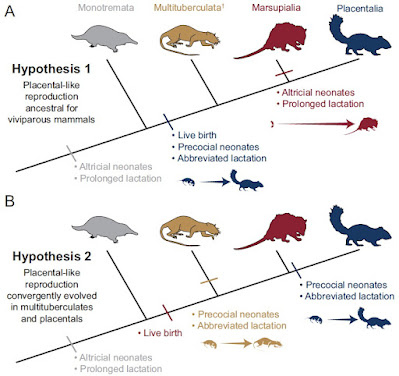 |
| a Mesodma mother with her relatively precocial offspring in Weaver, Fulghum, ... et Whitney, 2022. DOI: 10.1086/720410 artwork by Andrey Atuchin |
Abstract
The remarkable evolutionary success of placental mammals has been partly attributed to their reproductive strategy of prolonged gestation and birthing of relatively precocial, quickly weaned neonates. Although this strategy was conventionally considered derived relative to that of marsupials with highly altricial neonates and long lactation periods, mounting evidence has challenged this view. Until now the fossil record has been relatively silent on this debate, but here we find that proportions of different bone tissue microstructures in the femoral cortices of small extant marsupials and placentals correlate with length of lactation period, allowing us to apply this histological correlate of reproductive strategies to Late Cretaceous and Paleocene members of Multituberculata, an extinct mammalian clade that is phylogenetically stemward of Theria. Multituberculate bone histology closely resembles that of placentals, suggesting that they had similar life history strategies. A stem-therian clade exhibiting evidence of placental-like life histories supports the hypothesis that intense maternal-fetal contact characteristic of placentals is ancestral for therians. Alternatively, multituberculates and placentals may have independently evolved prolonged gestation and abbreviated lactation periods. Our results challenge the hypothesis that the rise of placental mammals was driven by unique life history innovations and shed new light on early mammalian diversification.
Keywords: bone histology, marsupial-placental dichotomy, reproduction, lactation, weaning, multituberculates
Lucas N. Weaver, Henry Z. Fulghum, David M. Grossnickle, William H. Brightly, Zoe T. Kulik, Gregory P. Wilson Mantilla and Megan R. Whitney. 2022. Multituberculate Mammals Show Evidence of a Life History Strategy Similar to That of Placentals, Not Marsupials. The American Naturalist. DOI: 10.1086/720410
@ASNAmNat @AndreyAtuchin



